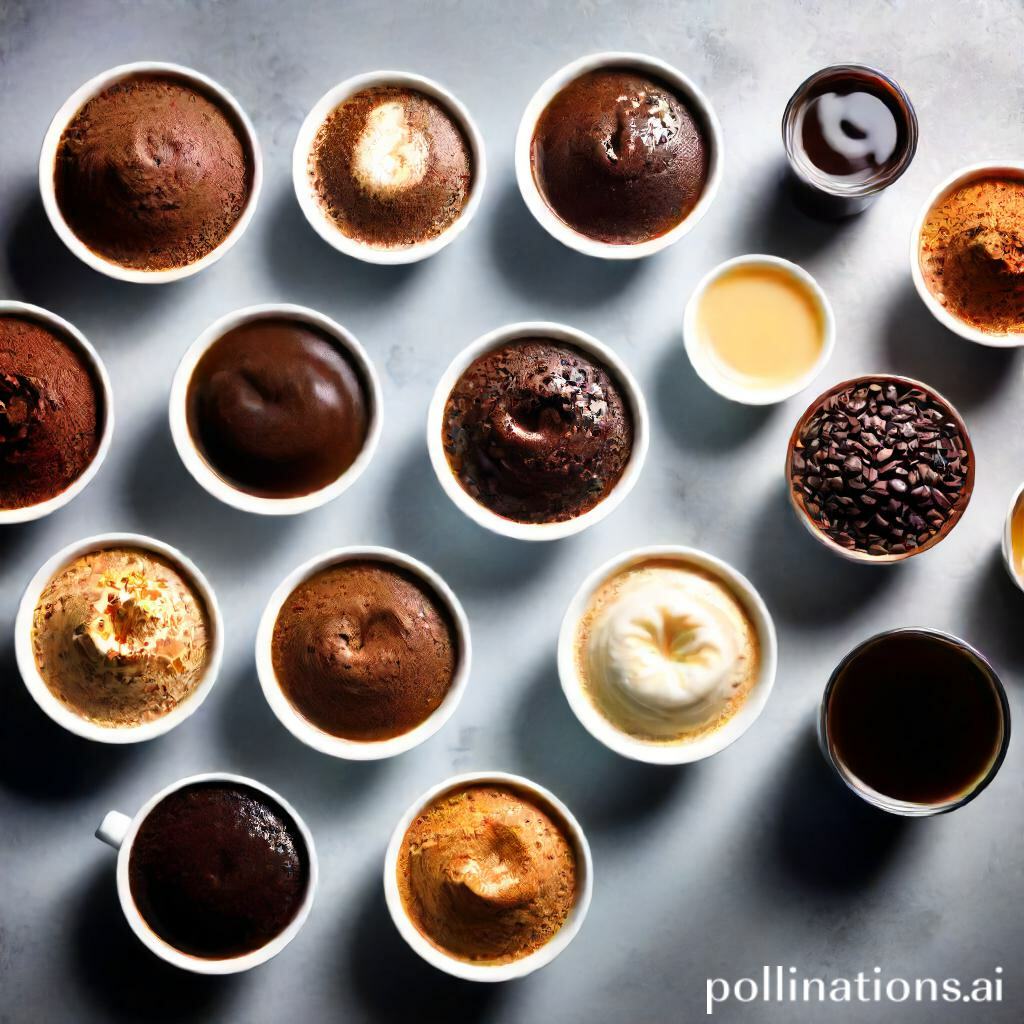Curious about the caffeine content in Lipton green tea purple acai blueberry? You’re in the right place! If you’re wondering whether this flavorful blend of Lipton green tea packs a caffeine punch or offers a soothing caffeine-free alternative, we’ve got the answers for you. Whether you’re looking to jumpstart your mornings or unwind with a refreshing cup in the evening, Comprehending the caffeine content of Lipton green tea purple acai blueberry can help you make an informed choice.
Join us as we delve into the world of this delightful tea flavor and explore its caffeine content.
Lipton Green Tea Purple Acai Blueberry Flavor
The Lipton Green Tea Purple Acai Blueberry flavor is a distinctive and invigorating blend that combines the benefits of green tea with the vibrant flavors of purple acai and juicy blueberries. This flavor offers a delightful and antioxidant-rich experience that is both refreshing and delicious.
1. Demonstration of the Specific Flavor
The Lipton Green Tea Purple Acai Blueberry flavor is carefully crafted to provide a burst of fruity goodness in every sip. This tea’s flavor profile is a harmonious combination of earthy green tea, tangy purple acai, and sweet blueberries. The blend of these flavors creates a refreshing and rejuvenating tea that is suitable for any time of the day.
2. Key Ingredients in Lipton Green Tea Purple Acai Blueberry
The key ingredients that make up the Lipton Green Tea Purple Acai Blueberry flavor are green tea, purple acai, and blueberries. Green tea is renowned for its numerous health benefits, including being a rich source of antioxidants and promoting overall well-being. Purple acai is a nutrient-dense superfood packed with antioxidants and essential nutrients. Blueberries, Nonetheless, are not only delicious but also contain high levels of antioxidants, vitamins, and minerals.
To create this flavor, Lipton carefully selects high-quality green tea leaves and combines them with the natural flavors of purple acai and blueberry. The result is a flavorful and aromatic tea that not only tastes great but also provides a range of health benefits.

Comprehending Caffeine in Tea
1. Function of Caffeine in Tea
Caffeine is a natural stimulant found in various beverages, including tea. It plays a significant role in tea, impacting its flavor and providing an energy boost to those who consume it.
In the realm of tea, caffeine acts as a natural pesticide, safeguarding the leaves from insects and other predators. It also contributes to the bitterness and astringency of the tea, adding complexity to its taste profile.
Moreover, caffeine stimulates the central nervous system, enhancing alertness and reducing fatigue. It can improve concentration and cognitive function, making it a popular choice for individuals seeking a quick energy boost.
2. Effects of Caffeine on the Body
Consuming caffeine can have various effects on the body, both advantageous and detrimental. It is crucial to comprehend how caffeine may influence your overall well-being.
2.1. Advantages of Caffeine
- Augmented Energy: Caffeine stimulates the release of neurotransmitters in the brain, leading to increased alertness and improved energy levels.
- Enhanced Focus: The stimulant properties of caffeine can aid in improving concentration and mental clarity.
- Mood Enhancement: Caffeine can positively impact mood by promoting the release of dopamine and other feel-good neurotransmitters.
2.2. Adverse Effects of Caffeine
- Insomnia: Consuming caffeine too close to bedtime can disrupt sleep patterns and cause difficulty falling asleep.
- Increased Heart Rate: Caffeine can temporarily elevate heart rate and blood pressure, which may be concerning for individuals with cardiovascular issues.
- Dehydration: Caffeine possesses diuretic properties, which can contribute to increased urine production and potential dehydration if not balanced with sufficient fluid intake.
| Type of Tea | Caffeine Content |
|---|---|
| Black Tea | 25-48 mg per 8 oz |
| Green Tea | 25-29 mg per 8 oz |
| Herbal Tea | 0 mg per 8 oz |
Gaining an Apprehending of the role and effects of caffeine in tea can assist individuals in making well-informed choices based on their personal preferences and health considerations.
Caffeine Levels in Lipton Green Tea
Relating to Lipton green tea, the amount of caffeine can vary depending on the flavor. In this section, we will explore the caffeine levels in Lipton green tea, specifically focusing on the purple acai blueberry flavor.
Variations in Caffeine Levels Among Different Flavors
Lipton offers a wide range of flavors in their green tea collection, and each flavor may have different caffeine levels. It is important to note that the caffeine content is not the same for all flavors. Whilst some flavors may contain more caffeine, others may have less or even be caffeine-free.
The Caffeine Levels of Lipton Green Tea Purple Acai Blueberry
If you enjoy the purple acai blueberry flavor, you may be curious about its caffeine content. Rest assured, Lipton green tea in the purple acai blueberry flavor does contain caffeine, although the exact amount may vary.
It’s important to mention that the caffeine levels in Lipton green tea purple acai blueberry are generally considered moderate. Nevertheless, it’s always a good idea to consume it in moderation, as individual sensitivities to caffeine can differ.
How Caffeine Levels are Determined
The caffeine content in Lipton green tea, including the purple acai blueberry flavor, is determined through thorough testing and analysis. Lipton uses industry-standard methods to measure the caffeine levels in their teas. These methods involve laboratory testing and may include the use of high-performance liquid chromatography (HPLC) techniques.

Does Lipton Green Tea Purple Acai Blueberry Have Caffeine?
Addressing the Specific Query
Many individuals wonder if Lipton green tea in the purple acai blueberry flavor contains caffeine. In this section, we will provide you with the accurate information you are seeking.
Providing Accurate Information on Caffeine Content
In regard to the caffeine content of Lipton green tea purple acai blueberry, the answer is affirmative, it does contain caffeine. Although, it is important to note that the quantity of caffeine may differ depending on the specific product and brewing method.
Caffeine Levels in Lipton Green Tea Purple Acai Blueberry
To give you an idea of the caffeine content, we have compiled a table below showcasing the approximate caffeine levels found in Lipton green tea purple acai blueberry:
| Product | Caffeine Content |
|---|---|
| Lipton Green Tea Purple Acai Blueberry (Bottled) | 15-30 mg per 8 fl oz serving |
| Lipton Green Tea Purple Acai Blueberry (Tea Bags) | 25-40 mg per 8 fl oz serving |
It is important to remember that these values are approximate and may slightly differ depending on factors such as brewing time and water temperature. Additionally, individual sensitivity to caffeine can also influence its effects on you.
If you are seeking to decrease your caffeine intake, there are decaffeinated alternatives available in the Lipton green tea range. These decaffeinated teas undergo a process to eliminate most of the caffeine, offering you a caffeine-free option without compromising on taste.
Now that you possess accurate information regarding the caffeine content in Lipton green tea purple acai blueberry, you can make an informed decision based on your personal preferences and caffeine sensitivity.
Non-Caffeinated Tea Flavors: Examining the Options
In regard to tea, many people enjoy the energizing effects of caffeine. Nonetheless, there are also those who prefer to avoid caffeine for various reasons. If you are looking for teas without caffeine or are interested in the benefits of choosing caffeine-free varieties, you’ve come to the right place. In this section, we will explore some alternative tea flavors and delve into the advantages of opting for caffeine-free options.
1. Non-Caffeinated Tea Options
If you’re seeking a tea experience without the jolt of caffeine, there are numerous options to consider. Here are a few popular choices:
- Herbal Tea: Herbal teas are made from a variety of plants and herbs, offering a wide range of flavors and potential health benefits. Common herbal tea options include chamomile, peppermint, and rooibos.
- Decaffeinated Tea: For those who still enjoy the taste of traditional tea but want to reduce their caffeine intake, decaffeinated tea is an excellent choice. Through a specialized process, the caffeine content is removed During preserving the flavor.
- Fruit Infusions: Fruit infusions are a delightful way to enjoy a flavorful and refreshing drink that is naturally caffeine-free. These teas are typically made by steeping dried fruits and herbs in hot water, resulting in a vibrant and fruity beverage.
2. Benefits of Choosing Caffeine-Free Teas
Opting for caffeine-free teas can offer several advantages, including:
- Improved Sleep: Drinking caffeine-free teas in the evening can help promote better sleep by avoiding the stimulating effects of caffeine.
- Reduced Anxiety: Some individuals may experience increased anxiety or jitters when consuming caffeine. Choosing caffeine-free teas can alleviate these symptoms.
- Hydration: Caffeine-free teas, such as herbal and fruit infusions, contribute to your daily hydration goals without the diuretic effects of caffeine.
Conclusion
It is crucial to have a clear Apprehending of the caffeine content in tea, including popular varieties like Lipton Green Tea Purple Acai Blueberry. By recapping the key points discussed in this article, we have highlighted the significance of being aware of the caffeine levels present in your tea choices.
Whether you are sensitive to caffeine or simply want to monitor your intake, knowing the caffeine content can help you make informed decisions about your beverage consumption. Remember to always check the label or consult reliable sources to ensure you are well-informed about the caffeine content in your preferred tea products.
Faq about Lipton Green Tea Purple Acai Blueberry
FAQ 1: Is Lipton green tea purple acai blueberry suitable for those sensitive to caffeine?
Lipton Green Tea Purple Acai Blueberry contains caffeine, which may not be suitable for individuals sensitive to caffeine. It is advisable to consult with a healthcare professional before consuming if you have specific dietary concerns.FAQ 2: Can I consume Lipton green tea purple acai blueberry before bed?
Due to its caffeine content, it is recommended to avoid consuming Lipton Green Tea Purple Acai Blueberry before bed, as it may interfere with your sleep. Opting for caffeine-free herbal teas might be a better choice at night.FAQ 3: Are there any health benefits associated with Lipton green tea purple acai blueberry?
Lipton Green Tea Purple Acai Blueberry is rich in antioxidants, which are beneficial for overall health. Antioxidants help in neutralizing harmful free radicals and support a healthy immune system.FAQ 4: How does the caffeine content of Lipton green tea purple acai blueberry compare to other flavors?
The caffeine content in Lipton Green Tea Purple Acai Blueberry is similar to other flavors of Lipton green tea. It is important to note that the caffeine content may vary slightly depending on the brewing method and serving size.FAQ 5: Can I drink Lipton green tea purple acai blueberry In the course of pregnant or breastfeeding?
It is generally recommended to limit caffeine intake during pregnancy and breastfeeding. Lipton Green Tea Purple Acai Blueberry contains caffeine, so it is advisable to consult with your healthcare provider for personalized guidance on caffeine consumption during this period. Please note that the information provided here is for general reference only. It is always best to consult with a healthcare professional or nutritionist for personalized advice based on your specific health needs.Read Similar Post:
1. Where To Buy Matula Tea?
2. Can Bubble Tea Cups Be Recycled?

